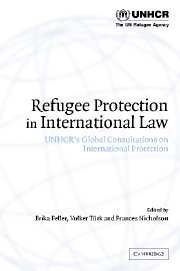Book contents
- Frontmatter
- Contents
- List of annexes
- Notes on contributors and editors
- Foreword
- Preface
- Acknowledgments
- Expert roundtables and topics under the ‘second track’ of the Global Consultations
- Table of cases
- Table of treaties and other international instruments
- List of abbreviations
- Part 1 Introduction
- Part 2 Non-refoulement (Article 33 of the 1951 Convention)
- Part 3 Illegal entry (Article 31)
- Part 4 Membership of a particular social group (Article 1A(2))
- 4.1 Protected characteristics and social perceptions: an analysis of the meaning of ‘membership of a particular social group’
- 4.2 Summary Conclusions: membership of a particular social group, expert roundtable, San Remo, September 2001
- 4.3 List of participants
- Part 5 Gender-related persecution (Article 1A(2))
- Part 6 Internal protection/relocation/flight alternative
- Part 7 Exclusion (Article 1F)
- Part 8 Cessation (Article 1C)
- Part 9 Family unity (Final Act, 1951 UN Conference)
- Part 10 Supervisory responsibility (Article 35)
- Index
4.2 - Summary Conclusions: membership of a particular social group, expert roundtable, San Remo, September 2001
Published online by Cambridge University Press: 28 August 2009
- Frontmatter
- Contents
- List of annexes
- Notes on contributors and editors
- Foreword
- Preface
- Acknowledgments
- Expert roundtables and topics under the ‘second track’ of the Global Consultations
- Table of cases
- Table of treaties and other international instruments
- List of abbreviations
- Part 1 Introduction
- Part 2 Non-refoulement (Article 33 of the 1951 Convention)
- Part 3 Illegal entry (Article 31)
- Part 4 Membership of a particular social group (Article 1A(2))
- 4.1 Protected characteristics and social perceptions: an analysis of the meaning of ‘membership of a particular social group’
- 4.2 Summary Conclusions: membership of a particular social group, expert roundtable, San Remo, September 2001
- 4.3 List of participants
- Part 5 Gender-related persecution (Article 1A(2))
- Part 6 Internal protection/relocation/flight alternative
- Part 7 Exclusion (Article 1F)
- Part 8 Cessation (Article 1C)
- Part 9 Family unity (Final Act, 1951 UN Conference)
- Part 10 Supervisory responsibility (Article 35)
- Index
Summary
The San Remo Expert Roundtable addressed the question of the meaning of ‘membership of a particular social group’ in the refugee definition, as contained in the1951 Convention Relating to the Status of Refugees. The discussion was based on a background paper by T. Alexander Aleinikoff, Migration Policy Institute and University of Georgetown, entitled ‘“Membership in a Particular Social Group”: Analysis and Proposed Conclusions’. In addition, roundtable participants were provided with written contributions from Justice Lory Rosenberg, United States Board of Immigration Appeals, Deborah Anker, Harvard Law School, and James C. Hathaway, University of Michigan, and subsequent comments were received from the US Government, and Joan Fitzpatrick, University of Washington. Participants included thirty-three experts from twenty-three countries, drawn from governments, NGOs, academia, the judiciary, and the legal profession. Lee Anne de la Hunt, from the University of Cape Town Legal Aid Clinic, moderated the discussion.
The following summary conclusions do not represent the individual views of each participant or necessarily of UNHCR, but reflect broadly the understandings emerging from the discussion.
The membership of a particular social group ground is the Convention ground with the least clarity. Varying interpretations have been given to it in different jurisdictions, with two dominant approaches having been developed in common law jurisdictions – those of protected characteristics and social perception. In civil law jurisdictions, this ground is less developed, with more focus placedon the interpretation of persecution and on the other four grounds. […]
- Type
- Chapter
- Information
- Refugee Protection in International LawUNHCR's Global Consultations on International Protection, pp. 312 - 313Publisher: Cambridge University PressPrint publication year: 2003



